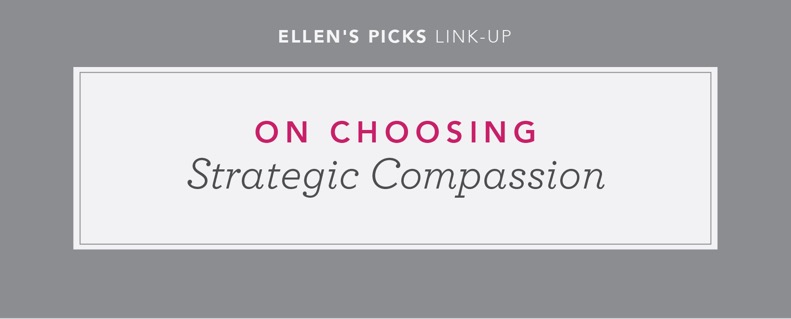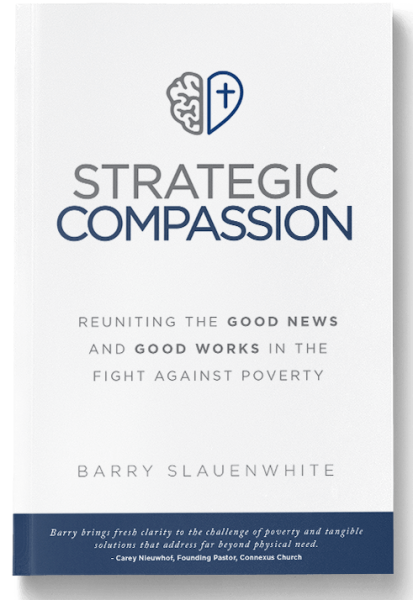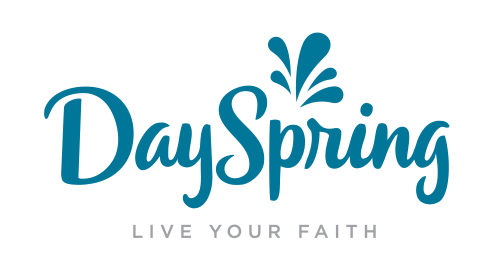
It’s a season of charity, and rightly so. Leading up to Christmas, we are deeply moved to give. To support various causes. To adopt a family in need. To share what we have with others. All of these things are good things – it’s the beautiful spirit of the season. God gave us Jesus – God With Us – how can we not be moved to give?
But, does what we give make the impact we hope it will?
 I’ve been challenged to think deeply this year about reuniting the good works we are called to do, and the Good News of Christmas. About how to give intentionally, thoughtfully and holistically. And I’m realizing that it might look different than I thought – and that poverty is not what I imagined it to be. I’m learning to consider addressing real poverty, thanks to Barry Slauenwhite’s new book, Strategic Compassion (read his recent guest posts on my blog here).
I’ve been challenged to think deeply this year about reuniting the good works we are called to do, and the Good News of Christmas. About how to give intentionally, thoughtfully and holistically. And I’m realizing that it might look different than I thought – and that poverty is not what I imagined it to be. I’m learning to consider addressing real poverty, thanks to Barry Slauenwhite’s new book, Strategic Compassion (read his recent guest posts on my blog here).
I was a missionary for five years, and I saw and learned a lot as the group I served with tried to respond to poverty holistically, but I still have so much more to learn. And I’ve been challenged in the years since that season: did my helping actually hurt? I keep nodding and agreeing with Barry as I read this book – he has put into words things that I’ve seen, but didn’t know how to articulate.
If nothing else, I’m digesting this truth: poverty – real poverty – is a human condition. Not just an “over there” problem, but a “me too” problem.
And I get the awesome opportunity to participate with what God is doing to bring true world-change, one transformed life at a time – starting with mine.
So, I’m learning right alongside our wee girl as we try to teach her generosity. She loves writing letters to the children we sponsor, and her dream is to get to visit and play with each one of them. She tells them about her whole life – school, Jesus, mom & dad, church, sports, her cat. In doing just that, she gives dignity to a person she cares about. It’s more than providing finances for school or medical care or food. It’s choosing to love this girl across the world, as a friend.
I’m learning that there really is Good News for the poor. It’s an overwhelming problem, but a problem with a real solution. I’m learning that poverty is physical, spiritual, emotional and psychological – not what we normally think of when someone says “poverty.” I’m learning that I can help lead others in compassionate understanding, and to address the poverty in our own hearts first.
So, whether it’s at Christmas time or any other time of the year, we can live and lead right where we are – in our families, in our homes, in our workplaces – modelling strategic compassion. And this is what is framing my Christmas giving: “our response to poverty needs to go beyond simply giving money. Rather, we want people to experience the holistic transformation that Jesus brings – the reconciling of all things to the wholeness found in Him.” (pg. 20)
And, there’s no better time of the year – when we remember that our weary world rejoices at the coming of Jesus – to learn how to practice just that.
Start here! Grab a copy of Strategic Compassion HERE.
This post is part of our Ellen’s Picks community linkup! Please visit my friends below and say hello.
















Thanks Ellen for sharing your thoughts on this – particularly from the perspective of your own experiences as a missionary. I too found myself saying “YES!!” to so many thoughts shared in Barry’s book “Strategic Compassion”. In my experiences in the majority world, I’ve always felt that God wants to save the whole person – not just address situational poverty, but to bring freedom, wholeness and dignity from the inside out and the outside in. That only happens in true, respectful partnership where we work together to address the root spiritual and social causes of poverty. Although good works in themselves are better than nothing, without the truth of the elevation and freedom the true gospel genuinely brings, change is only temporary. And having a temporary solution may be worse than no solution at all.
I so clearly remember working with a tribe that was enduring cyclical periods of drought in Northern Kenya. When things were at their worst, organizations would bring emergency food in for a few months. They shared with me that the adjustment back to little food after a 3 month feeding program was almost worse than just subsisting on little food. Their appetite had returned, their body became used to regular feedings and the transition back was almost unbearable. We were working on a project that would drought-proof them for life – giving them a sustainable way to grow produce that was run and maintained by them. Dads were finding a way to provide for their families, and moms were no longer having to watch their children die. The partnership we forged brought dignity and salvation in a truly holistic sense. To me, this is the true gospel.
Thanks again for introducing this important book to us!